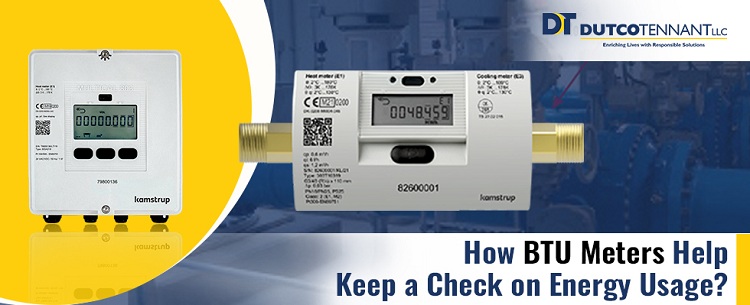
Empowering Energy Efficiency: The Role of BTU Meters in Monitoring and Managing Energy Usage
Now more than ever, the quest for sustainable living has gained immense momentum. To achieve this goal, the convergence of technology and energy management plays a pivotal role.
Enter BTU meters – the unsung heroes in the realm of energy efficiency, specifically designed to revolutionize the way we monitor and manage energy usage. In this blog, we'll delve into the fascinating realm of BTU meters and understand how they play a pivotal role in optimizing energy consumption.
What is BTU meters
BTU, or British Thermal Unit, is a standard unit of energy measurement commonly used in heating and cooling systems. BTU meters, therefore, serve as essential devices designed to measure the amount of energy required to heat or cool a space.
By providing accurate readings of energy consumption, these meters empower businesses and households to make informed decisions about their energy usage. With the consumption data in hand, consumers can gain increased efficiency and reduced environmental impact.
These devices come in various types, each catering to specific needs and circumstances.
Types of BTU Meters
Electromagnetic Type BTU Meter
The electromagnetic type is a stalwart in the world of BTU meters, particularly in HVAC applications. Employing the principles of electromagnetic flow measurement, this meter provides accurate readings of energy consumption.
Its non-intrusive nature makes it an ideal choice for applications where minimal disruption is essential in HVAC systems.
Electromagnetic flow meters work by applying a magnetic field to the liquid, generating a voltage proportional to its flow rate, which is then used to calculate energy consumption.
Ultrasonic Type - BTU Meter
Ultrasonic BTU meters, a rising star in energy management, leverage ultrasonic technology for precise measurements. By measuring the time of flight or frequency shift of ultrasonic waves in HVAC systems, these meters deliver accurate data on energy usage in heating or cooling processes.
Their non-intrusive installation ensures minimal maintenance and operational disruptions.
According to studies, ultrasonic BTU meters offer up to 98% measurement accuracy, making them a popular choice for modern energy management systems.
Clamp-on Type – BTU Meter
The clamp-on type is a game-changer for those seeking a hassle-free installation process, making it suitable for retrofitting existing HVAC systems. These BTU meters can be easily attached to pipelines without cutting or welding.
Utilising ultrasonic technology, they provide accurate readings, offering a convenient and efficient solution.
It is ideal to use clamp-on meters for temporary monitoring and energy audits, though they may require ideal pipe conditions to remain accurate.
How BTU Meters Improve Energy Efficiency
Real-time Monitoring and Accountability
One of the key advantages of BTU meters is their ability to provide real-time data on energy consumption by hvac energy use monitoring. Gone are the days of waiting for monthly utility bills to assess energy usage patterns.
With BTU meters in place, users can monitor their energy consumption on a daily or even hourly basis. This real-time monitoring not only fosters awareness but also encourages accountability, prompting individuals and organisations to adopt more energy-efficient practices.
According to a case study conducted on a commercial office building, BTU meters for real-time monitoring reduced energy costs by 20%.
Precision in Billing
For property managers and facility owners, precision in billing is crucial. BTU meters play a pivotal role in accurately measuring the energy consumption of individual tenants or departments within a building.
This ensures fair and transparent billing, promoting a sense of equity among users. With the ability to identify and address energy inefficiencies promptly, businesses can optimise their operations and reduce overall energy costs.
In order to ensure accurate submetering and energy accountability, regulatory standards such as ASHRAE 90.1 recommend using BTU meters.
Optimising HVAC Systems
Heating, ventilation, and air conditioning (BTU meters in HVAC) systems are significant contributors to energy consumption in buildings. BTU meters help optimise the performance of these systems by providing insights into their efficiency.
By identifying areas where energy is being wasted or overused, building managers can make informed decisions to improve the overall efficiency of their HVAC systems, leading to substantial energy savings.
It is estimated that optimizing HVAC systems with BTU meters can lead to a 30% improvement in overall energy efficiency.
Environmental Impact
As the global community grapples with climate change, the role of BTU meters in reducing environmental impact cannot be overstated. Their capability to contribute towards energy efficiency can help in the overall reduction of greenhouse gas emissions.
The use of BTU meters for energy management can reduce carbon footprints by up to 25%, contributing significantly to sustainability goals.
Choosing the Right BTU Meter
Consider the following when choosing a BTU meter:
- Flow Type: Depending on system compatibility, choose from clamp-on, ultrasonic, or electromagnetic flow.
- Accuracy & Calibration: Industrial applications benefit from higher precision versions.
- Installation Requirements: Clamp-on meters are non-invasive, however certain meters require pipe modifications.
- Data Integration: For better control, make sure it works with smart building management systems.
Conclusion
The transformative impact of BTU meters on HVAC systems is paramount in many ways as we explored here. It's evident that these devices are indispensable tools in our journey towards energy efficiency and sustainability.
If you are searching for dependable and high-quality BTU meters then be sure to check out our stock. We at Dutco Tennant LLC supply an expert range of products to meet your energy needs.
